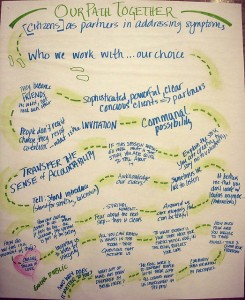 I subscribe to the Strachan-Tomlinson Question of the Week email which sends out a provocative question (or form of question). They get me thinking and help me with one of THE most important facilitation/leadership/working skills I know of: asking questions. I’m not great at asking questions and am always seeking to improve my practice.
I subscribe to the Strachan-Tomlinson Question of the Week email which sends out a provocative question (or form of question). They get me thinking and help me with one of THE most important facilitation/leadership/working skills I know of: asking questions. I’m not great at asking questions and am always seeking to improve my practice.
I have been intrigued by questions that help frame responsibility in a group, rather setting up an expectation that the convenors, facilitators, leaders, whatever — are responsible for everything. That is rubbish. This week’s question does that for me:
Question of the week | January 11, 2012
Ask “What is one thing you do not want to see happen
in this session”This question enables participants to voice their concerns and contribute to norm setting in a group. Responses may also yield potential insights for the facilitator about previous group process experiences of participants. To bring this discussion to a positive conclusion, ask participants what they need to do to avoid what they don’t want to see happen in a session. This will result in people setting positive norms for working together. See Making Questions Work, Chapter 4, “Questions for Opening a Session”, p 88.
This reminds me of a question Peter Block asked at the Nexus for Change gathering in 2008. It was something to the effect of “if this meeting (project, etc) were to be a failure, what would your role be in that failure? The guts of these questions all point to the idea of everyone getting “skin in the game.” Owning it. Not simply applauding or rejecting from the side. IN THE GAME. It is too easy to sit back and criticize. It is harder to foster the conditions, to create the invitation and ask the questions that get them to engage and own it. That’s why I like these questions.
For more on questions and methods that encourage ownership and responsibility, see:
- http://grouppatternlanguage.org/wagn/Inquiry
- Some great links on a summary post from Dave Pollard http://howtosavetheworld.ca/2008/05/03/
- Related, but moving from collective engagement to collective action from Geoff Brown (Via Dave) http://www.yesandspace.com.au/?p=24
- Related, but beyond question, from Peter Block’s FlameCenter’s methodologyThis methodology uses powerful questions and changes the conversations to those that confront people with their choice in accountability and commitment. The six conversations are:
- From Mandate to Invitation
- From Problem solving to Possibility
- From Blame to Ownership
- From Lip service to Dissent
- From Barter to Commitment
- From Deficits to Strengths